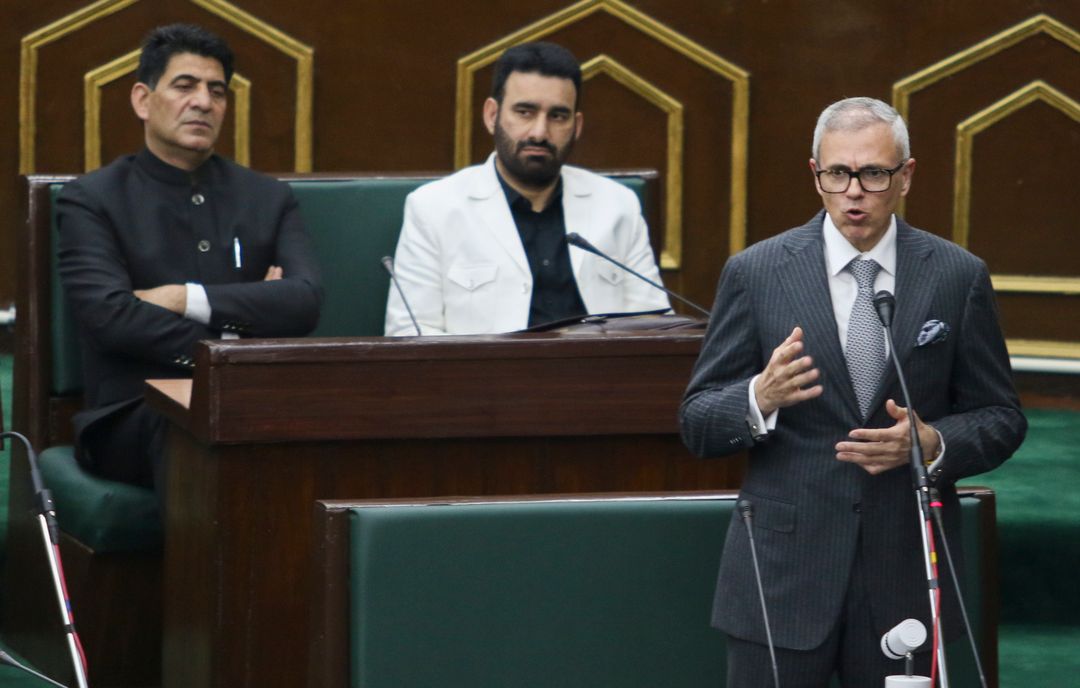
Jammu, March 3 — Jammu and Kashmir Chief Minister Omar Abdullah expressed his admiration for former Prime Minister Manmohan Singh, acknowledging his significant role in advancing peace efforts between India and Pakistan, particularly on the Kashmir issue. Speaking on the first day of the Budget Session of the Jammu and Kashmir Assembly, Abdullah revealed that during the Manmohan Singh-led UPA government, India and Pakistan came closer to resolving the Kashmir issue. However, he noted that he did not foresee a return to that situation within his lifetime.
Abdullah was paying tribute to Singh and four other former legislators during obituary references. These included the late Syed Ghulam Hussain Geelani, Shamsher Singh Manhas, Ghulam Hassan Parrey, and Choudhary Piara Singh, all of whom passed away since the last assembly session in November. A two-minute silence was observed in the House to honor their memory. Speaker Abdul Rahim Rather initiated the obituary reference after Lt Governor Manoj Sinha’s address. Several other members, including Sham Lal Sharma (BJP), G.A. Mir (Congress), and M.Y. Tarigami (CPI-M), also spoke in tribute.
In his tribute, Abdullah reflected on Singh's long journey from a village in what is now Pakistan to becoming India's Prime Minister. He praised Singh for his economic reforms, which helped transform India into an economic powerhouse, and for his work in social welfare initiatives. Abdullah recalled how Singh, building on the foundation laid by Atal Bihari Vajpayee and Pakistan’s former President Pervez Musharraf, took on the responsibility of advancing peace talks with Pakistan, despite escalating tensions.
“During that period, both countries came closer to resolving the Kashmir issue,” Abdullah said, adding, "I do not see a return to the situation in my lifetime." He highlighted Singh’s sincere efforts to address the challenges posed by terrorism and violence, particularly in 2010, when Singh formed several working groups to address political and governance issues in the state. These initiatives, Abdullah noted, remain relevant today.
A key focus of Abdullah's praise was Singh’s handling of the displaced Kashmiri Pandit community. The Chief Minister credited Singh for taking tangible steps to provide relief, including job reservations and the establishment of the Jagti township in Jammu for Pandits living in dire conditions. "There was no such effort from anyone else," Abdullah remarked.
Additionally, Abdullah praised Singh for his contributions to infrastructure development in Jammu and Kashmir. He recalled how the former prime minister had initiated the four-lane Jammu-Srinagar national highway project, which the Lt Governor had recently mentioned. Abdullah also spoke about the railway project that would soon connect Kashmir to the rest of India, adding that he hoped the Prime Minister would inaugurate it soon.
Reflecting on the ongoing railway project, Abdullah remarked that Singh had laid the foundation for the Chenab Bridge, which, when completed, would be the world’s highest railway bridge. “Singh may no longer be with us, but he can take satisfaction in knowing that the work he started was completed by the present government,” he said.
Abdullah also spoke about Singh’s humble and approachable personality. He recalled a personal experience when Singh had promptly apologized after a misunderstanding during Abdullah's previous tenure as Chief Minister.
While paying tribute to Singh’s leadership, Abdullah acknowledged the immense contributions Singh made to India’s growth and its relations with Pakistan. In his final remarks, Abdullah emphasized Singh’s legacy, which he believes will be better appreciated by history.
In response, M.Y. Tarigami of the CPI-M called for improving relations between India and Pakistan to foster lasting peace in the region. BJP's Sham Lal Sharma also credited Singh with laying the groundwork for India's economic progress, which helped the country achieve the status of the fifth-largest economy in the world.
As the session continued, discussions centered on the need for continued peace efforts and the importance of building on the progress made during Singh's tenure.